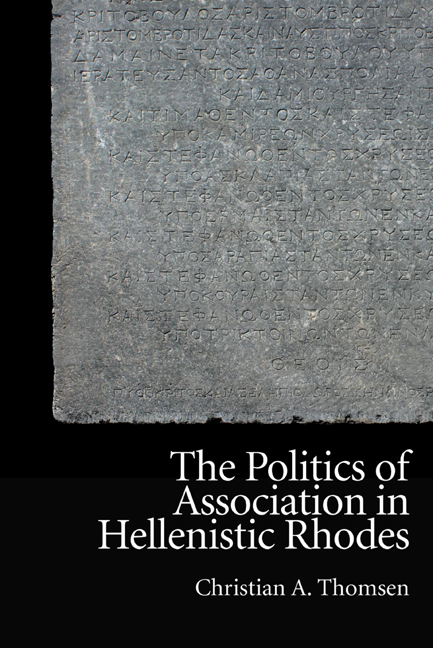Book contents
- Frontmatter
- Contents
- List of Tables and Figures
- Acknowledgements
- Abbreviations of Epigraphic Corpora
- Maps
- 1 Introduction
- 2 Rhodian Democracy
- 3 The Oikos
- 4 Public Associations
- 5 Private Associations
- 6 Private Associations and Human Resources
- 7 The Civic Aspirations of Private Associations
- 8 The Corporate Polis
- Bibliography
- Index Locorum
- General Index
6 - Private Associations and Human Resources
Published online by Cambridge University Press: 08 October 2020
- Frontmatter
- Contents
- List of Tables and Figures
- Acknowledgements
- Abbreviations of Epigraphic Corpora
- Maps
- 1 Introduction
- 2 Rhodian Democracy
- 3 The Oikos
- 4 Public Associations
- 5 Private Associations
- 6 Private Associations and Human Resources
- 7 The Civic Aspirations of Private Associations
- 8 The Corporate Polis
- Bibliography
- Index Locorum
- General Index
Summary
Towards the end of the preceding chapter, we came upon the monument of an unknown member of the Rhodian elite. It catalogued twenty-three different private associations which had all been attached to him through the exchange of benefactions and honours. The monument, unique for its sheer number of associations, nevertheless represents a clear trend. Together, the monuments of the elite give evidence of an associational arms race in which the members of the magisterial elite constantly sought to establish relations with more and more private associations. This requires explanation; and falling back on the idea of a disinterestedly sociable Rhodian elite clearly will not do.
The preceding chapter traced an outline of private associations in Rhodes and analysed how continued interaction of members and the placing of trust in others for the maintenance of important activities, such as proper observance of rituals, the maintenance of burial plots and association finances, resulted in the development of strong ties of loyalty and reciprocity. I have argued that such associations were formed around pre-existing networks whose members shared one or more trait, such as a common occupation or membership in public subdivisions. As a result we posed the question: how and under which conditions were the human resources of the associations exploited?
THE RICH AND THE TALENTED
The arts
The Rhodian state on various levels invited its citizens in their various public associations to compete against each other in putting on the most splendid choruses. At the federal level each of the three old poleis competed as tribes (phylai) in several festivals held in the asty. The Alexandria and Dionysia festivals featured choric competitions in several disciplines. At the polis level the Lindian Sminthia in honour of Apollo enjoyed worldwide fame and was the subject of a treatise by Philomnestos. The festival involved a competition of six choruses, paid for by wealthy citizens on behalf of the three Lindian tribes. Sometime in the first half of the second century the Lindian tribe of Argeia was triumphant with a comic chorus under the choragos Onasandros son of Euphanes, priest of Lindos in 165 BCE and at some stage also grammateus of the Rhodian boula and the prytaneis.
- Type
- Chapter
- Information
- The Politics of Association in Hellenistic Rhodes , pp. 105 - 128Publisher: Edinburgh University PressPrint publication year: 2020



